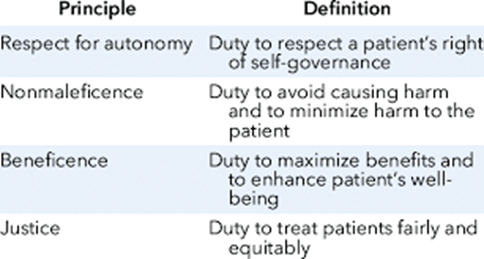A nurse manager is reviewing clients' rights with the nurses on the unit. The nurse manager should tell the nurses that informed consent promotes which of the following ethical principles?
Autonomy
Nonmaleficence
Justice
Fidelity
The Correct Answer is A
A. Autonomy is the ethical principle that respects the right of clients to make their own decisions and choices regarding their health care. Informed consent is a process that ensures that clients are fully informed of the benefits, risks, alternatives, and consequences of a proposed treatment or procedure, and that they voluntarily agree to it.
B. Nonmaleficence is the ethical principle that obliges health care providers to do no harm to clients, either intentionally or unintentionally. Informed consent does not directly promote this principle, although it may help to prevent harm by disclosing potential risks and complications.
C. Justice is the ethical principle that requires fair and equal treatment of all clients, regardless of their personal characteristics, preferences, or values. Informed consent does not directly promote this principle, although it may help to ensure that clients are not coerced or manipulated into accepting a treatment or procedure that they do not want or need.
D. Fidelity is the ethical principle that requires health care providers to be faithful and loyal to their clients, and to honor their commitments and promises. Informed consent does not directly promote this principle, although it may help to establish trust and rapport between clients and providers.

Nursing Test Bank
Naxlex Comprehensive Predictor Exams
Related Questions
Correct Answer is B
Explanation
A. Muscle stiffness is not a common or serious adverse effect of ibuprofen. Ibuprofen is an anti-inflammatory drug that can reduce pain and stiffness caused by arthritis.
B. Stomach pain or bloody stools are signs of gastrointestinal bleeding, which is a serious and potentially fatal adverse effect of ibuprofen. Ibuprofen is a nonsteroidal anti-inflammatory drug (NSAID) that can cause ulceration, perforation, and hemorrhage of the stomach or intestines . The nurse should ask the client about any gastrointestinal symptoms and advise them to avoid alcohol, smoking, and other NSAIDs while taking ibuprofen.
C. Dry cough is not a common or serious adverse effect of ibuprofen. Dry cough is more likely to be caused by angiotensin-converting enzyme (ACE) inhibitors, which are used to treat hypertension and heart failure.
D. Increase in urine output is not a common or serious adverse effect of ibuprofen. Ibuprofen can cause renal impairment, which can lead to decreased urine output, not increased urine output. The nurse should monitor the client's renal function tests and fluid balance while taking ibuprofen.
Correct Answer is C
Explanation
A. Documenting the client's refusal in the medical record is an important action, but not the first one. The nurse should first try to understand the client's perspective and address any concerns or misconceptions they might have about the blood transfusion. This choice is incorrect.
B. Honoring the client's decision to refuse the blood transfusion is a respectful and ethical action, but not the first one. The nurse should first attempt to educate and persuade the client about the benefits and risks of the treatment, and respect their autonomy only after ensuring that they have made an informed decision. This choice is incorrect.
C. Exploring the client's reasons for refusing the treatment is the first action that the nurse should take. The nurse should use effective communication skills to elicit the client's beliefs, values, fears, and preferences regarding the blood transfusion, and provide factual and evidence-based information to address any knowledge gaps or misconceptions. The nurse should also assess the client's decision-making capacity and determine if they are competent to refuse the treatment. This choice is correct.
D. Discussing the client's refusal with the provider is an appropriate action, but not the first one. The nurse should first try to resolve the issue with the client directly, and involve the provider only if they are unable to do so or if there are legal or ethical implications that require further consultation. This choice is incorrect.
Whether you are a student looking to ace your exams or a practicing nurse seeking to enhance your expertise , our nursing education contents will empower you with the confidence and competence to make a difference in the lives of patients and become a respected leader in the healthcare field.
Visit Naxlex, invest in your future and unlock endless possibilities with our unparalleled nursing education contents today
Report Wrong Answer on the Current Question
Do you disagree with the answer? If yes, what is your expected answer? Explain.
Kindly be descriptive with the issue you are facing.
